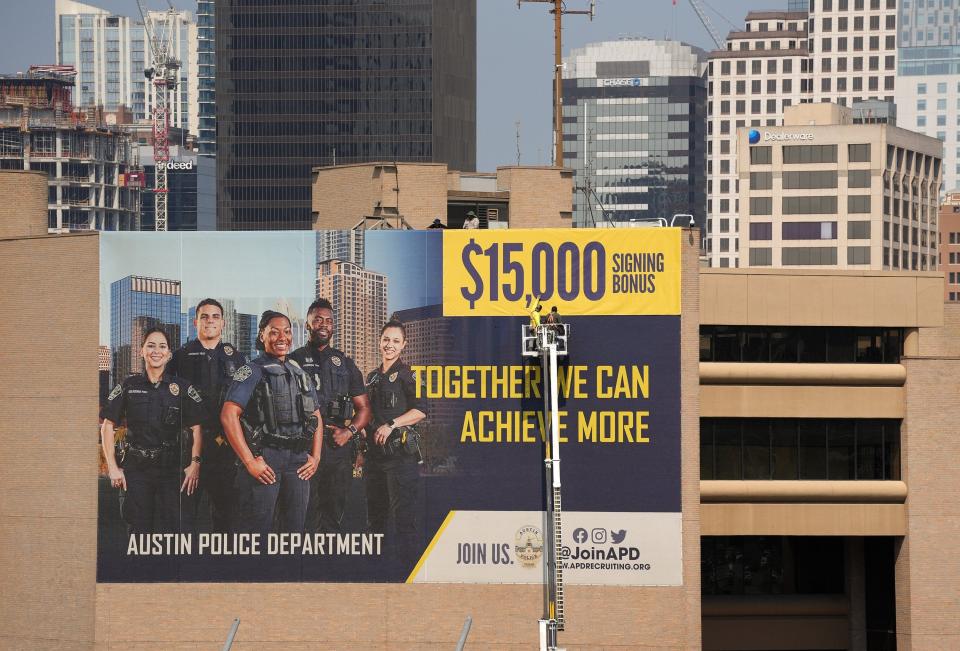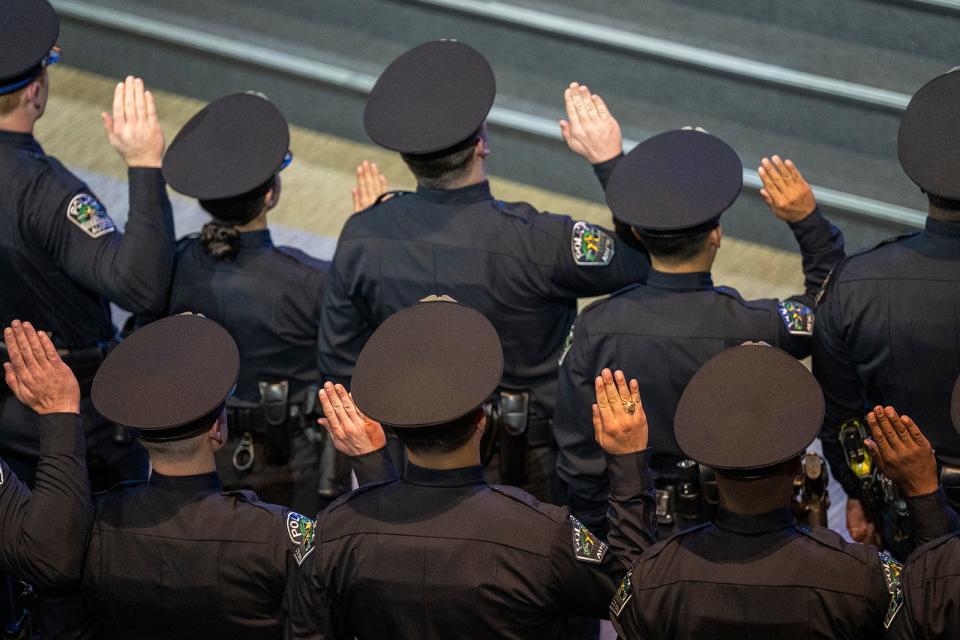No contract puts Austin police at 'disadvantage' in recruiting efforts as vacancies persist
Recruiting efforts by the Austin Police Department seem promising for the start of the year, but further complications spurred by the police union not being under contract could make it more difficult to hire people.
February will bring the beginning of the 152nd cadet class, which as of Thursday had 87 prospective cadets, the highest number since the 144th cadet class, which graduated two years ago, said Cmdr. Corey Wroblewski, who oversees the department's recruiting efforts.
Combined with the graduation of 25 cadets in early January and another possible 43 who are expected to graduate in April, the Austin Police Department could add nearly 150 new officers to its ranks this year. Another cadet class is scheduled to start in July.
"We're hoping for the first time since 2020 to get to a point where we're actually not losing more people than we're gaining," Jeff Greenwalt, the Police Department's chief of staff, said Tuesday at a meeting of the city's Public Safety Commission. "And 2024 might be that year."
More: Will the Austin police union and city reach a long-term contract this year? What we know.
However, that number, while an improvement from the previous years, won't be enough to fill the department's 333 vacancies, which have spiked since 2020 for various reasons. Among them is that some officers felt the profession was under attack in the wake of high-profile killings of Black people by police, which prompted widespread calls for police accountability. That year, the City Council cut $150 million from the department's budget, though the funding was reinstated the next year per state law and has been raised every year since.
Another factor is the inability of the city and the police union to reach agreement on a contract. The Austin Police Association and the mayor seem to agree that a contract could improve various problems plaguing the department, such as high attrition rates.
Last year, 160 people left the department, more than any other year in the department's history, Greenwalt said Tuesday.
Despite improvements in hiring, Assistant Police Chief Gizette Gaslin told the American-Statesman there's still the potential for more people to leave this year, as nearly 250 people are eligible for retirement.
Additionally, while the department is hoping for up to 150 people to join its ranks this year, it's possible that number could be lower, as people often drop out of the cadet class. For instance, the class that graduated this month started with 34 people, but 25 finished the eight-month program.
To help fill the vacancies — 230 of which are patrol officer positions, Gaslin said — police have been working overtime to cover the gaps. In the first quarter of the current fiscal year, officers worked more than 121,000 overtime hours, and the department has already spent 38% of its overtime budget for the year, according to data presented at Tuesday's meeting.
No contract puts Austin Police Department at 'disadvantage' in recruiting efforts
One recruiting measure the department has been using will probably be lost early this year due to the police union and city not having a contract. The previous contract, which expired last March, gave certain provisions to the Police Department for potential hires.
Mainly, it allowed the department to offer some of the tests required to become a cadet on a regular two-week schedule or in places outside of the city. But after the 152nd cadet class begins next month, that will be lost, as the police will fall back under "civil service law."
Instead of offering those tests every two weeks, the tests will have to be offered on a specific date in Austin, reducing flexibility for people working to become cadets, Wroblewski said.
Civil service law also slows the frequency at which tests can be offered; the results of all test takers in a given session must be reviewed before another test can be scheduled.
That provision will affect potential cadets in the class that's set to start in July. Greenwalt told commissioners Tuesday that recruiting this class through civil service will "be a bit of a learning curve" and "a disadvantage for us to get as many people as we want in" the class.
"We're dealing with adults," Wroblewski said. "They have lives, they have timetables, they have jobs that they're going to, and then travel is expensive."
More: Lawsuit alleges Austin needs to do more to implement Prop A, police oversight referendum
In a statement sent to the American-Statesman, Mayor Kirk Watson said this is a good example of why the city and the police union need to get back to the table and negotiate a contract. Austin Police Association President Michael Bullock previously said that until a police oversight lawsuit filed against the city is resolved, he doesn't believe the city can bargain in good faith.
"State civil service law is prescriptive and prevents the City from doing things that our police department needs, that our officers need and that our community wants," Watson said in his statement.
Gaslin said she's hopeful that being under civil service law won't hamper the department's abilities to recruit more people. When she joined the department in the 1990s, it was under civil service law, and she signed up to join with 3,000 other people.

Challenges persist in getting people to become police officers
Both Gaslin and Wroblewski said recruiting people to become police officers has been tough. It's a dwindling pool of people who decide to choose law enforcement as a career, and Austin isn't the only department suffering vacancy issues, as it's a nationwide problem.
Wroblewski said this means the department has to "sell" Austin to potential hires who don't live in the city. He said the department's biggest success has come in ramping up the number of hiring events.
Since Wroblewski started about eight months ago, recruiters have been attending, on average, four hiring events a week. Before, they were averaging one a week.
"Historically, we were getting about 100 cadets a year, broken down into three or four micro classes," Wroblewski said. "Since I've been here, that number has gone up 50%."
Part of the police recruiting effort is the department's 30x30 initiative, by which the department aims to have 30% of recruits be women by 2030.
The city began offering an incentive of up to $15,000 if someone completes the cadet class. Watson said in a newsletter Friday that he's going to propose an amendment for another ordinance similar to last year's that will continue the incentive for cadets.
The City Council passed an ordinance last year to ensure police kept their salaries and benefits after the city rejected a contract with the police union.
Watson said he will propose the ordinance, which also includes incentives for officers if a contract agreement is reached by June 30, at the City Council's meeting Thursday.

This article originally appeared on Austin American-Statesman: Austin police hope to bolster numbers this year amid ongoing vacancies

